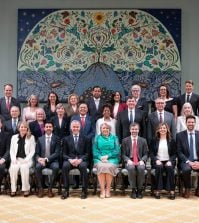Biden ends COVID testing for unvaccinated feds, leaked report exposes bullying in UK Cabinet Office: management & workforce news in brief

Global Government Forum’s weekly digest of the news you need to know but might have missed.
Biden ends COVID testing for unvaccinated federal employees
The Biden administration has told agencies to stop testing unvaccinated employees for COVID-19 as it changes tack in its attempts to inoculate the US federal workforce.
Guidance on the changes, which came into effect on 22 August, was sent to agencies by email from the Chief Human Capital Officers Council.
The decision means agencies will no longer need to perform ‘serial screen testing’ on employees based on their vaccination status, and that federal government will no longer treat employees differently based on whether or not they are up to date with their jabs.
In addition, employees, contractors and visitors won’t be asked to disclose their vaccination status before entering a federal building. Some agencies will retain the ability to request vaccination information, though not through the now discontinued governmentwide vaccination certification form.
Read more: Different policies apply to US government officials based on vaccine status
If a federal employee is exposed to COVID-19, they will no longer have to undergo different isolation requirements to other employees, instead following the same protocol as their vaccinated colleagues. That means not having to stay at home and quarantine, provided they are asymptomatic.
Masks will remain a requirement in areas with high infection rates, and employees will need to observe rules as they apply to local jurisdictions.
Read more: Were governments right to introduce COVID-19 vaccine mandates?
Hong Kong plans crackdown on civil servant misconduct
Action against civil servants for professional misconduct is expected to intensify under plans by the Hong Kong government to ratchet up punitive measures.
In the past financial year, 51 civil servants were removed from public service while 1,124 officials received disciplinary action between 1 April 2017 and 31 March this year, according to the Civil Service Bureau. Of the 1,124, 155 were removed from public service.
The bureau also said it had terminated 70 government workers with a requirement that they retire “in the public interest” under section 12 of the Public Service (Administration) Order of 2021. These cases involved civil servants who refused both to declare allegiance to the Hong Kong Special Administrative Region, and to vow to uphold the Basic Law.
The bureau submitted a document containing the information to the Hong Kong Legislative Council on Tuesday last week, following a motion passed in June on ‘Reforming the civil service system to enhance government effectiveness’.
Read more: Hong Kong civil servants defy allegiance oath
“Going forward, we would continue to require bureaux/departments to take more resolute action promptly against officers with misconduct, so as to enable the cases to be handled in a fair and just manner,” the Civil Service Bureau wrote.
Dominic Lee of the New People’s Party, and a Legislative Council Member – who drafted the motion passed in June – has suggested further measures, such as introducing formal warnings for poor performers and streamlining contract terminations.
These stricter measures follow the introduction by Beijing of the national security law in 2020, which makes it easier to punish protesters and reduces Hong Kong’s autonomy.
Read more: Pro-Beijing security chief to be Hong Kong’s next leader
Leaked report exposes bullying and racism in UK Cabinet Office
Evidence of bullying and racism within the UK Cabinet Office has come to light in a leaked internal report documenting cases of mistreatment, as well as a lack of disciplinary action.
The report, which has been seen by the BBC, found that one in 10 members of staff at the government’s key policy delivery department had experienced some form of bullying or harassment.
It found that ethnic minority staff in particular felt pressured to “fit it”, meaning they often changed the way they naturally spoke or presented themselves to play down their ethnic identity. Others meanwhile described microaggressions, such as being mistaken for another member of staff.
Read more: UK Cabinet Office to shed 25% of staff as part of ‘war on Whitehall waste’
A 2021 staff survey found the Cabinet Office has the joint highest rate of bullying and harassment of all UK departments, and the third highest rate of discrimination. Survey respondents said the department was dominated by people with “posh” London accents. “We have to be a certain way in order for people around us to perceive us as being just as valid as someone who went to Oxbridge,” one staff member said.
The leaked report said such factors “could lead those from other socioeconomic backgrounds to feel like outsiders and self-conscious”.
The survey also showed that while 37% of those who had experienced bullying or harassment in the past year had reported these incidents, some feared doing so might harm their career in government.
The Cabinet Office employs around 10,000 people, though it is expected to lose 25% of its staff over the next three years as part of a bid to return Whitehall headcount to 2016 levels.
Canadian public service chief says ‘much more needed’ to combat racism and improve diversity
The Canadian public service has reiterated its commitment to confronting racism and becoming more equitable, diverse, inclusive and accessible in its annual report to prime minister, Justin Trudeau.
Making the issue “everyone’s priority” is one of three key action areas pinpointed by cabinet secretary and clerk of the Privy Council, Janice Charette. Though much has already been done, “we cannot underestimate the work ahead of us”, she said.
Read more: ‘More needed’ to combat racism in Canadian public service, says chief
Charette described what progress had been made since her predecessor Ian Shugart issued a call to action on racism, equity and inclusion in the federal public service last year. Initiatives include the launch of the Mosaic Leadership Development Program, which aims to address underrepresentation at the executive level; a pilot recruitment initiative designed to hire neurodivergent candidates into the public service; and a whole-of-government apprenticeship programme designed to improve the representation of indigenous peoples in the federal government’s IT community.
Charette described this as “a start” but said that while most government organisations “are taking concrete action to do better… much more is needed”.
She added: “Retaining the confidence of our employees requires us to take seriously the need to stamp out racism and discrimination of all types in our workplaces and make the public service inclusive, accessible and representative of the population it serves.
“Not only is this the right thing to do for our employees, both current and future, but it will allow us to design and deliver solutions that better respond to Canadians’ diverse needs.
“We cannot lose our focus. This is about ongoing action to transform over the long term, and every public servant has a role to play,” she said.
Like this story? Sign up to Global Government Forum’s email news notifications to receive the latest news and interviews in your inbox.






















